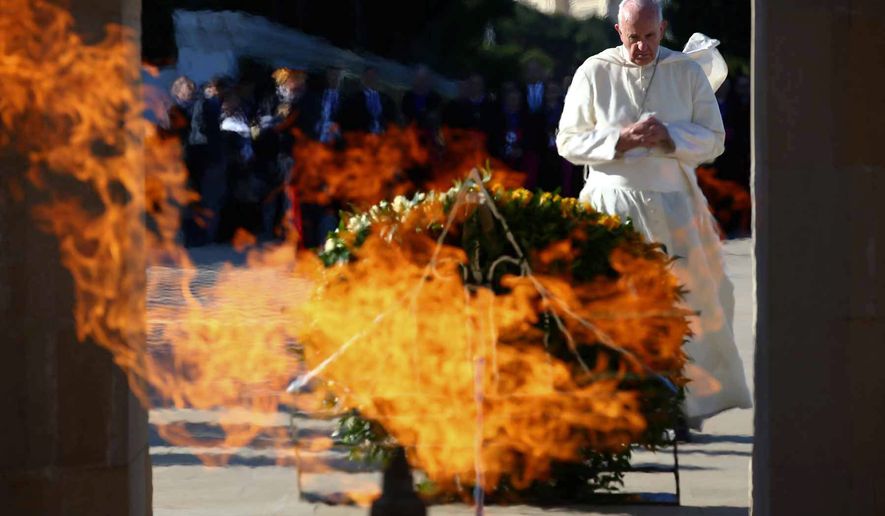OPINION:
As Pope Francis was concluding the trip of the Caucasus, his last stop was the capital of the predominantly Muslim Azerbaijan. In Baku, the pontiff was received with full honors and welcomed by cheering crowds representing the nation’s small Catholic flock as well as more numerous Muslim and Jewish communities. While a papal visit to the once-Soviet Caucasus is significant in itself, visiting a modern, secular Muslim nation like Azerbaijan sends an especially profound message. Even more significant is the fact that this was already a second papal visit in Azerbaijan’s 25 years of independence: Pope John Paul II visited Baku in 2002.
Azerbaijan’s President Ilham Aliyev recognized the significance of the visit by describing it as “historic” and reiterating the nation’s commitment to upholding the long-standing traditions of inclusiveness and tolerance. Mr. Aliyev stated that Azerbaijan is proud to be home for its citizens of all faiths and to serve as “both a geographic and a spiritual bridge between East and West.” This sentiment was echoed by Pope Francis, who spoke of his joy seeing “the cordial relations enjoyed by the Catholic, Muslim, Orthodox and Jewish communities.”
Having celebrated the Holy Mass at Baku’s Church of Immaculate Conception, the pope visited the Heydar Mosque, where he met with Azerbaijan’s Muslim, Jewish and Christian leaders. Symbolically, in one of the world’s few mosques, where Shia and Sunni pray side by side, Azerbaijan, true to its history, brought together people of different faiths to meet the pontiff. Perhaps, this is only natural as Azerbaijan was the first predominantly Muslim nation to establish a republic in 1918 and to grant equal voting rights for all its citizens, including minorities and women.
In today’s, often bitterly divided, world, Azerbaijan sets an example and provides hope, a notion reflected by Pope Francis. “Friendly relations and coexistence here are important for peace in the world as this shows that adherents of different confessions can live together in sincerity, mutual respect and cooperation for common goals.” Warm welcome for the pope and wide acceptance of his message in Azerbaijan underscore the crucial role of education, as well as traditions of tolerance and diversity in rejecting radicalism and extremist ideologies. Of course, another key element is the genuine commitment of the national leadership to upholding and promoting such traditions.
Yet, developing the enormous potential of the Caucasus is undercut by the ongoing unresolved conflicts, including the long-lasting Armenia-Azerbaijan conflict. Pope Francis called for peace in the region and addressed the hundreds of thousands of refugees displaced as a result of Armenia’s occupation: “I wish to express my heartfelt closeness to those who have had to leave their land and to the many people who suffer the effects of bloody conflicts.”
Before departing Baku, Pope Francis visited the hilltop memorial to those, who died defending Azerbaijan’s independence and integrity. Walking along the memorial to lay the wreath, the pope saw the names of men and women of different ethnicities and faiths, who gave their lives when their common home, Azerbaijan, was attacked. This, too, is a reminder that our nation’s diversity and inclusiveness makes us more joyful when we celebrate and stronger when we face hardship.
The pope’s words of peace and inclusiveness resonated on the shores of the Caspian Sea. By engaging in a dialogue and building on conversations the pontiff had in Azerbaijan, hopefully, we can all together expand the receptive audience globally.
• Elin Suleymanov is Azerbaijan’s ambassador to the United States.




Please read our comment policy before commenting.